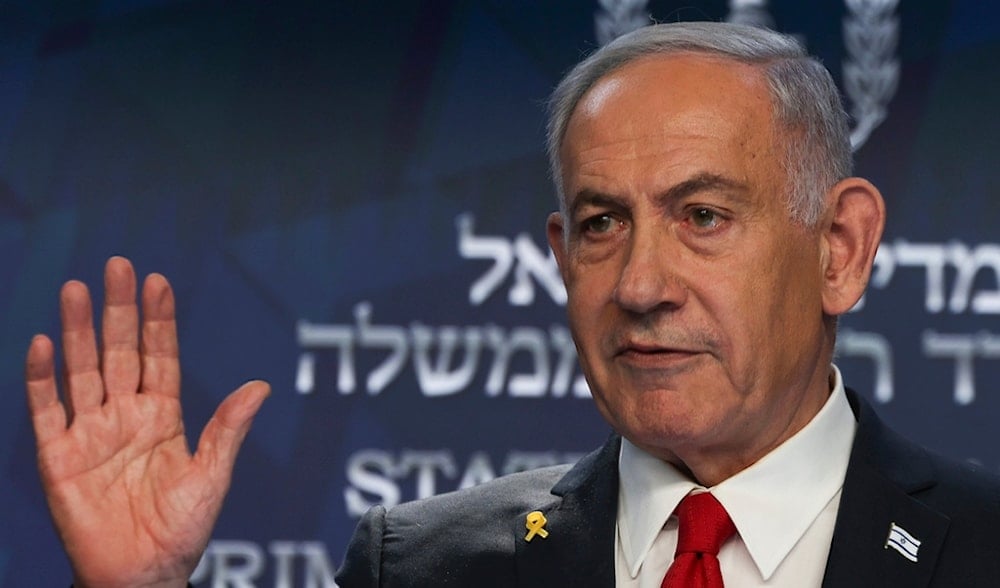Netanyahu seeks US-mediated 'peace talks' with Syria's interim govt.
Israeli PM Benjamin Netanyahu is pushing for US-brokered negotiations with Syria’s new leadership under Ahmad al-Sharaa, aiming to secure a security agreement and move toward normalization.
-

Israeli Prime Minister Benjamin Netanyahu speaks during a press conference in occupied al-Quds, Wednesday, May 21, 2025. (AP)
Israeli Prime Minister Benjamin Netanyahu has expressed interest in initiating US-mediated negotiations with the new Syrian government led by interim President Ahmad al-Sharaa, according to two Israeli officials, as cited by Axios.
The talks would mark the first formal engagement between the two sides since 2011 and are aimed at establishing an updated security agreement with the possibility of advancing toward full normalization.
Netanyahu conveyed his intentions during a meeting with US envoy Tom Barrack, a close confidant of President Donald Trump. The proposal follows a significant shift in US policy after Trump’s high-profile meeting with al-Sharaa in Riyadh, during which all US sanctions on Syria were lifted.
Shift in Israeli policy towards Syria
The change in tone from the Netanyahu government is particularly striking. Following the collapse of the al-Assad regime and the rise of al-Sharaa’s government, "Israel" launched a series of airstrikes that targeted and dismantled Syria’s remaining air force, naval assets, air defense systems, and missile infrastructure.
"Israel" also took control of the buffer zone between the two countries and occupied strategic territory inside Syria, including Mount Hermon. Proclaimed concerns over Turkish influence initially led the Netanyahu government to lobby Washington to proceed cautiously in recognizing the new Syrian leadership.
However, Trump’s decision to engage directly with al-Sharaa prompted a shift in Israeli calculations. Officials have since begun engaging with Syria’s leadership, first indirectly through intermediaries and then in direct, secret meetings in third countries.
One senior Israeli official remarked that al-Sharaa does not appear to be taking directives from Ankara and is seen as more pragmatic than initially assumed. “It is better for us that the Syrian government is close to the US and Saudi Arabia,” the official noted.
Strategic interests: Golan Heights, Iranian presence, demilitarization
During his visit to "Israel", Barrack met with Netanyahu and other top officials. He was shown key strategic sites along the Syrian border, including the Israeli-occupied side of Mount Hermon. A week earlier, Barrack had been in Damascus, where he met with al-Sharaa and reopened the US ambassador’s residence in the Syrian capital.
While in Damascus, Barrack described the Syria-Israeli conflict as “a solvable problem” and suggested beginning talks with a basic non-aggression agreement.
Netanyahu reportedly told Barrack he hopes to use the momentum from Trump’s engagement with Syria to pursue a phased set of agreements, starting with a revised security arrangement modeled on the 1974 disengagement deal. The ultimate goal, officials said, is a comprehensive normalisation agreement.
According to an Israeli official, "Israel" presented its key red lines for any future deal: no Turkish military bases on Syrian soil, no return of Iranian or Hezbollah forces, and full demilitarization of southern Syria. "Israel" also signaled it would maintain its presence in Syrian territory until these conditions are formalized.
In the context of a potential future border agreement, "Israel" has expressed interest in adding US forces to the UN contingent previously stationed along the border.
US role in shaping future Syria-'Israel' relations
After concluding his visit to "Israel", Barrack traveled to Washington to brief President Trump and Secretary of State Marco Rubio. “I can assure you the President’s vision with the Secretary’s execution is not only hopeful but achievable,” Barrack wrote on social media platform X.
Spent the afternoon at the White House with President Trump and @SecRubio discussing Middle East affairs that all relate to Türkiye and Syria. I can assure you the President’s vision with the Secretary’s execution is not only hopeful but achievable.
— Ambassador Tom Barrack (@USAMBTurkiye) June 7, 2025
A senior US official confirmed that Barrack relayed "Israel’s" security concerns and its red lines, and noted al-Sharaa’s openness to negotiations. According to Israeli officials, the Golan Heights issue, long a sticking point in previous peace efforts, is expected to resurface, though the current Syrian leadership may adopt a more flexible stance than that of the Assad regime.
Trump’s prior recognition of the Golan Heights as part of "Israel", a move not reversed by the Biden administration, adds further complexity to the issue. However, with shifting alliances and a changing geopolitical landscape, officials on all sides suggest a new diplomatic chapter may be within reach.
Read more: Syrian-Israeli normalization 'very possible’, Trump allies say

 4 Min Read
4 Min Read








